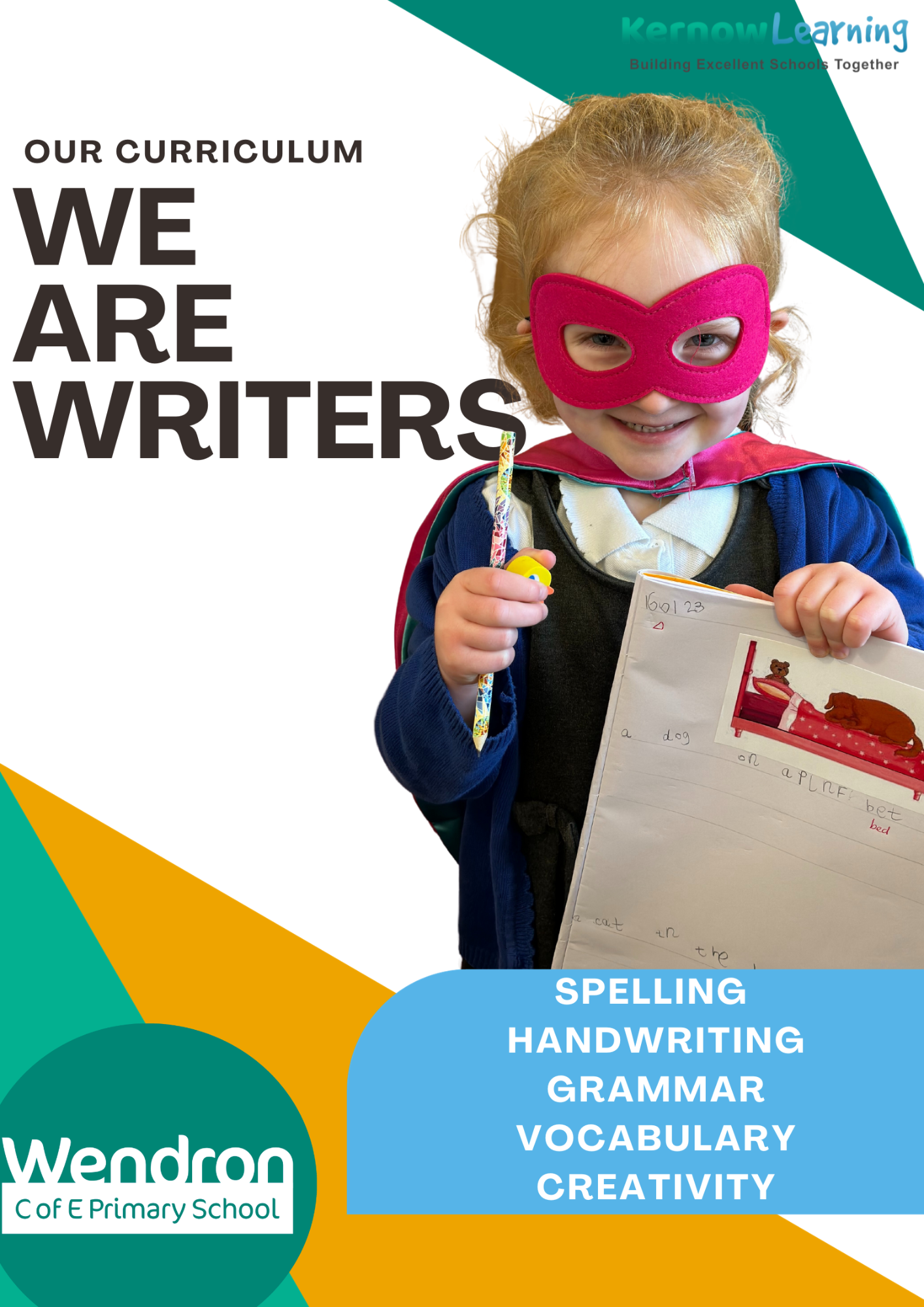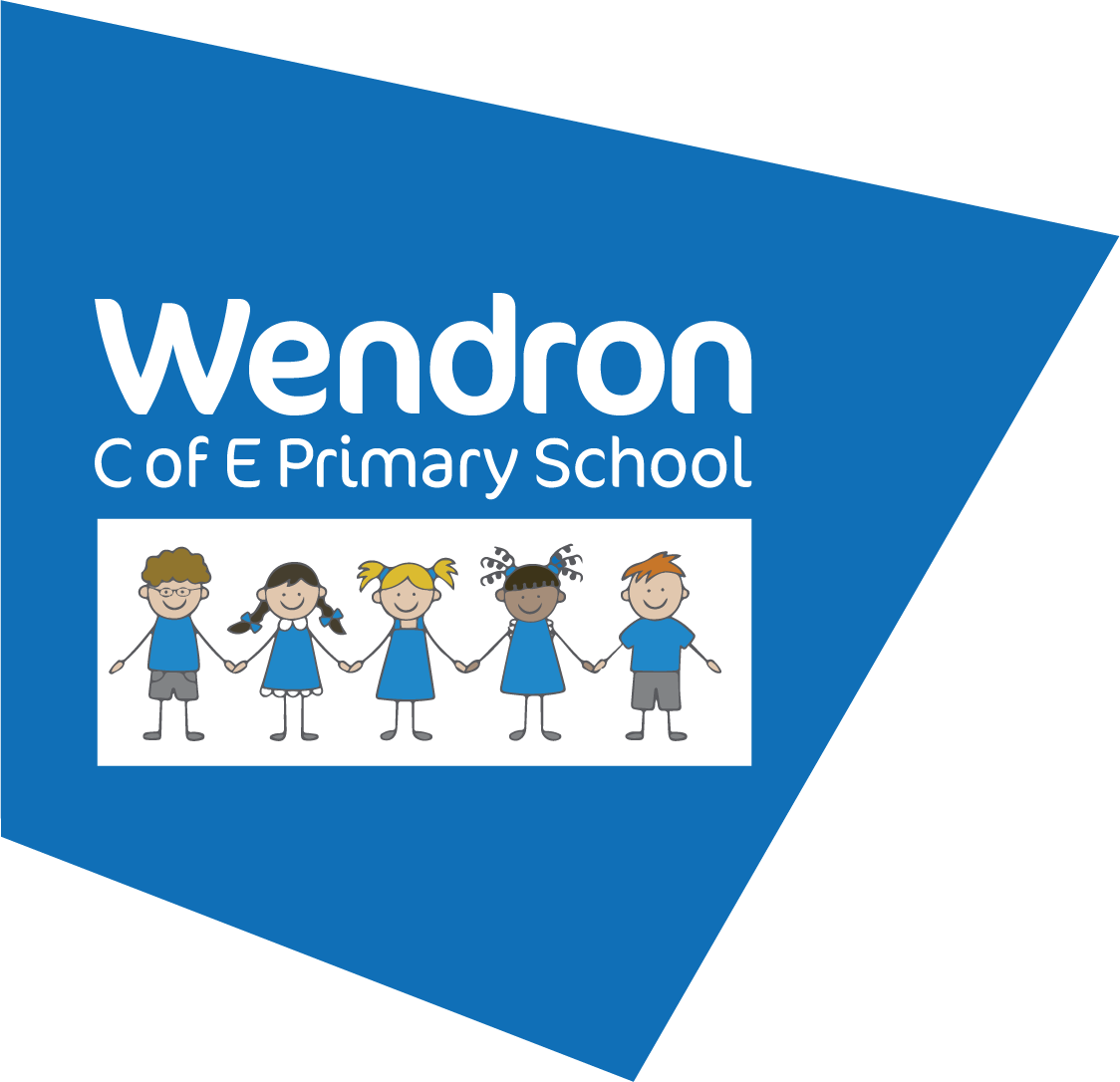
Subject Information
Please click on a subject title below to find out how each subject is taught in each year group.
Art and Design
Intent
At Wendron C of E Primary School, we provide a positive and caring environment that ensures every child has the opportunity to reach their full potential. We are committed to providing all children with learning opportunities to engage in Art and believe that every child within our school should have full access to the Art provision as laid down in the National Curriculum regardless of age, gender or ability. The intent of our Art education is to give pupils the skills, concepts and knowledge necessary for them to express their responses to ideas and experiences in a visual or tactile form. It fires their imagination and is a fundamental means of personal expression.
While it is essentially a practical subject, art should provide opportunities for reflection and, with increasing sensitivity, pupils should acquire the ability to make informed, critical responses of their own work and that of others. There is great pleasure to be derived from Art learning and, through deeper understanding; pupils can gain access to cultural richness and diversity. The appreciation and enjoyment of the visual arts enriches all our lives. At Wendron we believe that the learning of Art provides a valuable educational, as well as social and cultural experiences for children of all ages. Pupils develop life skills and have the chance to extend their knowledge of a practitioner’s works.
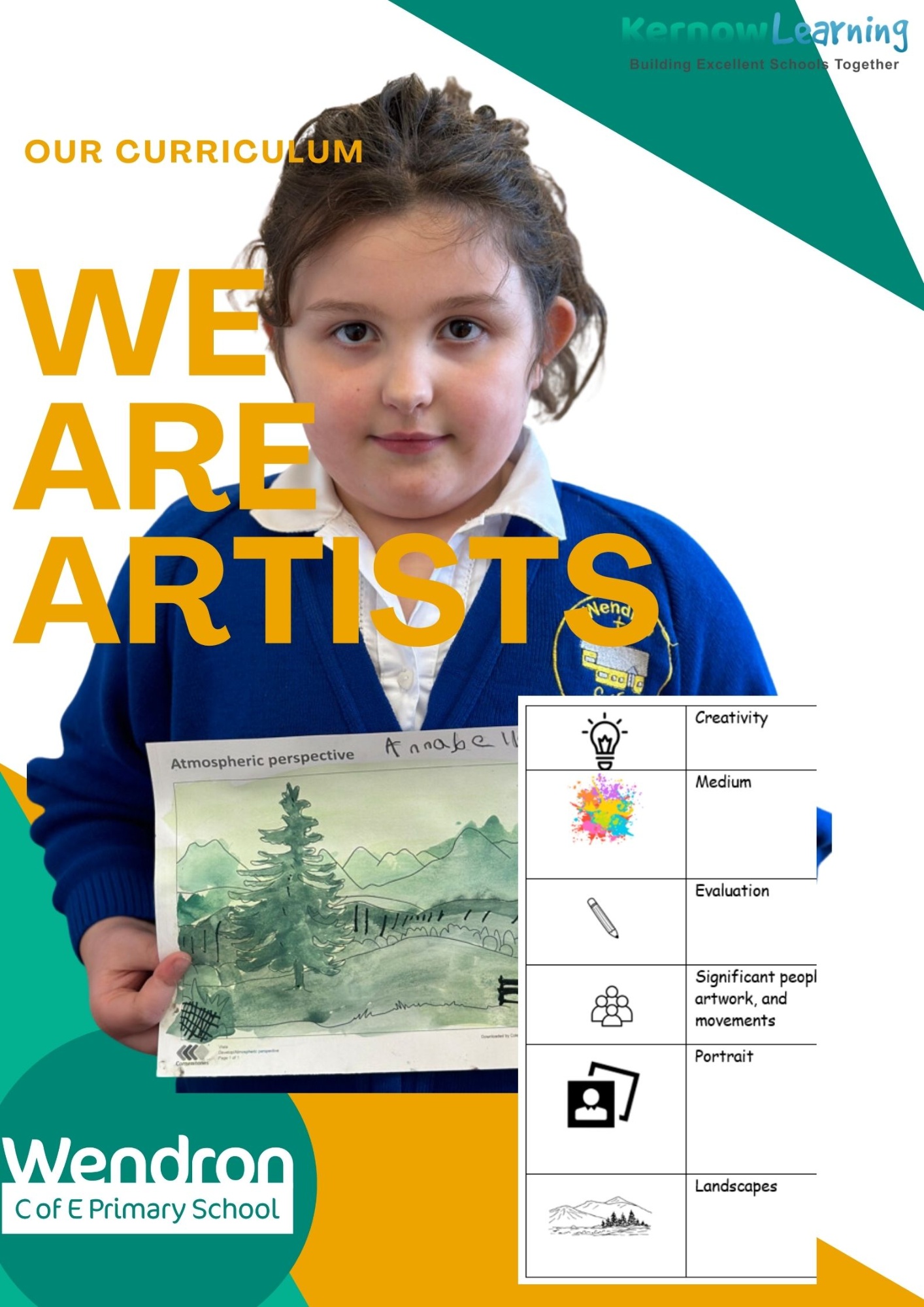
Implementation
Our whole school curriculum provides children with opportunities to develop their skills in art using a range of media and materials. Children have the opportunity to explore and evaluate different creative ideas developing skills in drawing, painting, printing, collage, textiles, 3D work and digital art.
Children study a range of works by famous artists to develop knowledge of styles. The skills they acquire during art lessons are linked to their PSHE, allowing children to use their art skills to reflect on and explore topics in greater depth; for example, using art as a medium to express emotion and thoughts to enhance their personal, social and emotional development; as well as through cross-curricular opportunities in the classroom.
Art is displayed to motivate and inspire others and to celebrate the pupils’ artwork in their class.
Impact
Our Art Curriculum is planned to demonstrate progression and to stimulate creativity. Pupils are clear about what the intended outcomes are and have a means to measure their own work against this, as a means of expression or to explore the styles of other artists that inspire our own work.
In Art, children are reflective and evaluate their own and each other’s work, thinking about how they can make changes to keep improving. This is meaningful and continuous throughout the process, with evidence of age-related verbal and written reflection. Children are encouraged to take risks, experiment, and then reflect on why some ideas and techniques are successful or not for a particular project.
Computing
Intent
The computing curriculum at Wendron C of E primary School aims to provide the children with the skills and knowledge necessary to use technologies safely and creatively. Over time, the children will become increasingly more independent using technologies, be able to work collaboratively when solving complex problems and develop resilience when finding solutions by learning from mistakes. Children will embrace and enjoy technology, understand its importance in their everyday lives and recognise that there are exciting career opportunities to be had in computing technologies. It is the intention to develop every child’s computing abilities and technical knowledge during their time at Wendron, in order that they leave primary school with a solid foundation in 21st century skills.
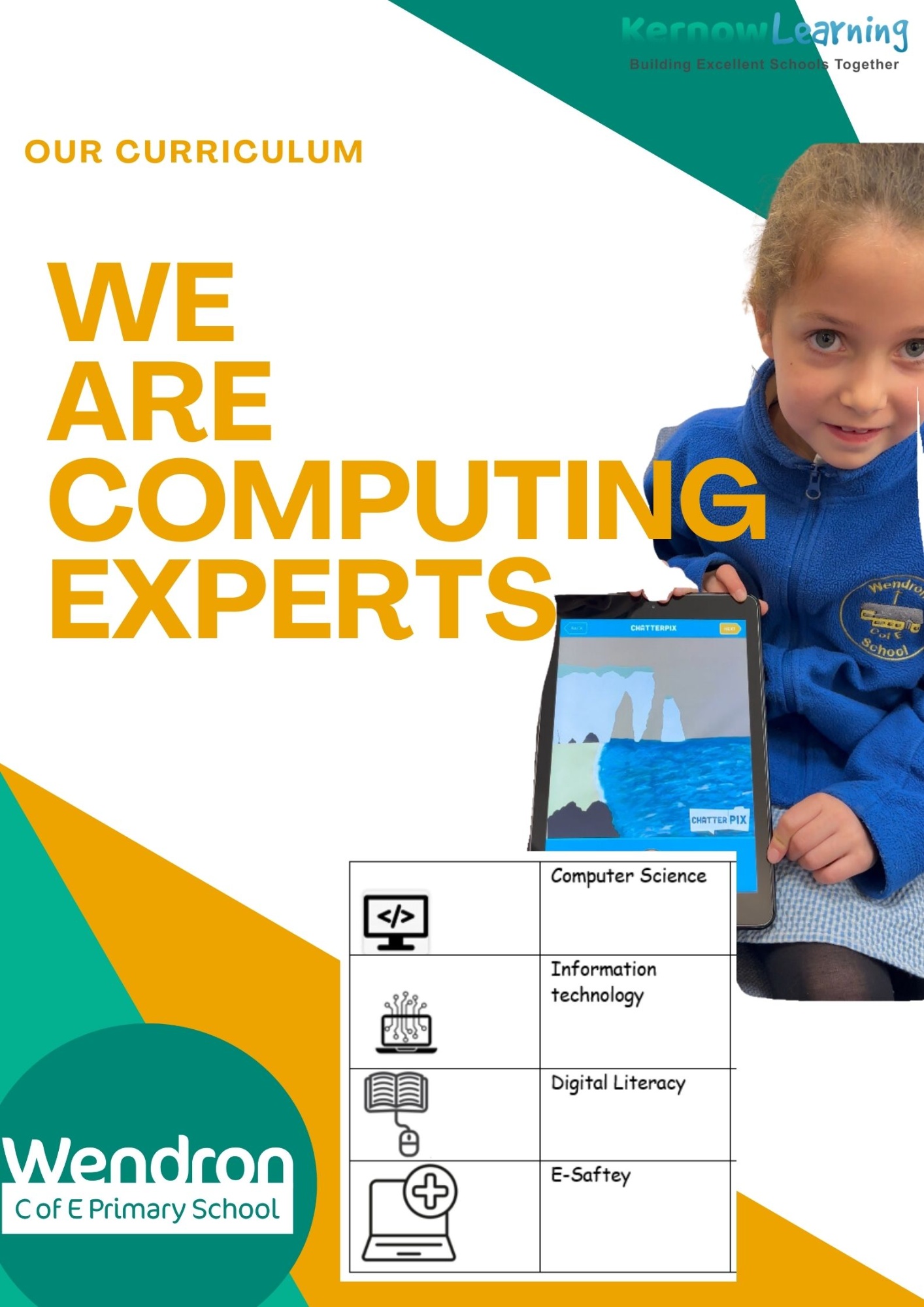
Implementation
Implementation of the computing curriculum will build on the subject leader evaluation completed during the previous academic year. It will seek to ensure consistency in the teaching of computing and the experiences of the children across the year groups. The following measures will help ensure the curriculum is thoroughly implemented and the intent is achieved.
- Computing lessons taught at least once a week
- Standalone lessons are provided to tie in with wider curriculum and ensure computing is not taught in isolation.
- Scheme of work progression-grid available to track progress across the school.
- Yearly overviews provided to teachers in order to highlight teaching requirements for academic year.
- Teachers to gather proof-of-progress evidence for 3 children of mixed ability termly.
- Pupil voice to be completed in autumn 2, spring 2 and summer 2 in order to ascertain progress
- Links with technology professionals in and around the local area to be developed in order to bring inspirational speakers into school.
- Safer internet week to be promoted and school to participate in nation-wide initiative.
- Internet safety issues continue to be addressed through parent workshops, provision of reading materials and regular updates of current issues through the school facebook page.
Impact
A thorough implementation of the computing curriculum will have the following impact for the children in Wendron C of E School:
- The children will have been taught, understand and can apply the subject content as laid out in the computing programme of study.
- The children are able to articulate their understanding of computing science, digital literacy and information technology. They are able to give examples of ways to stay safe on-line and recognise acceptable/unacceptable behaviour.
- There is consistency across the year groups in the quality and frequency of learning using technologies and in the progress made by the children.
- The children can cite examples of times technology has allowed them to access a lesson in the wider curriculum.
Design Technology
Intent
At Wendron School, we aim to build a Design and Technology curriculum that is inspiring, rigorous and practical. Through our curriculum, children will use creativity and imagination to design and make products that solve real and relevant problems within a variety of contexts. We aim to build strong cross-curricular links; children will draw on disciplines such as mathematics, science, engineering, computing and art. We aim to harness opportunities to acquire a broad range of knowledge; our children will: take risks, innovate, learn skills in resourcefulness and as a result will become enterprising and capable citizens. We intend for children to develop a wider view of the importance of design and technology to our everyday lives and advancements across the wider world through the evaluation of past and present design. We intend that our Design and Technology curriculum will prepare our children, to give them the opportunities, responsibilities, and experiences they need to be successful in later life.
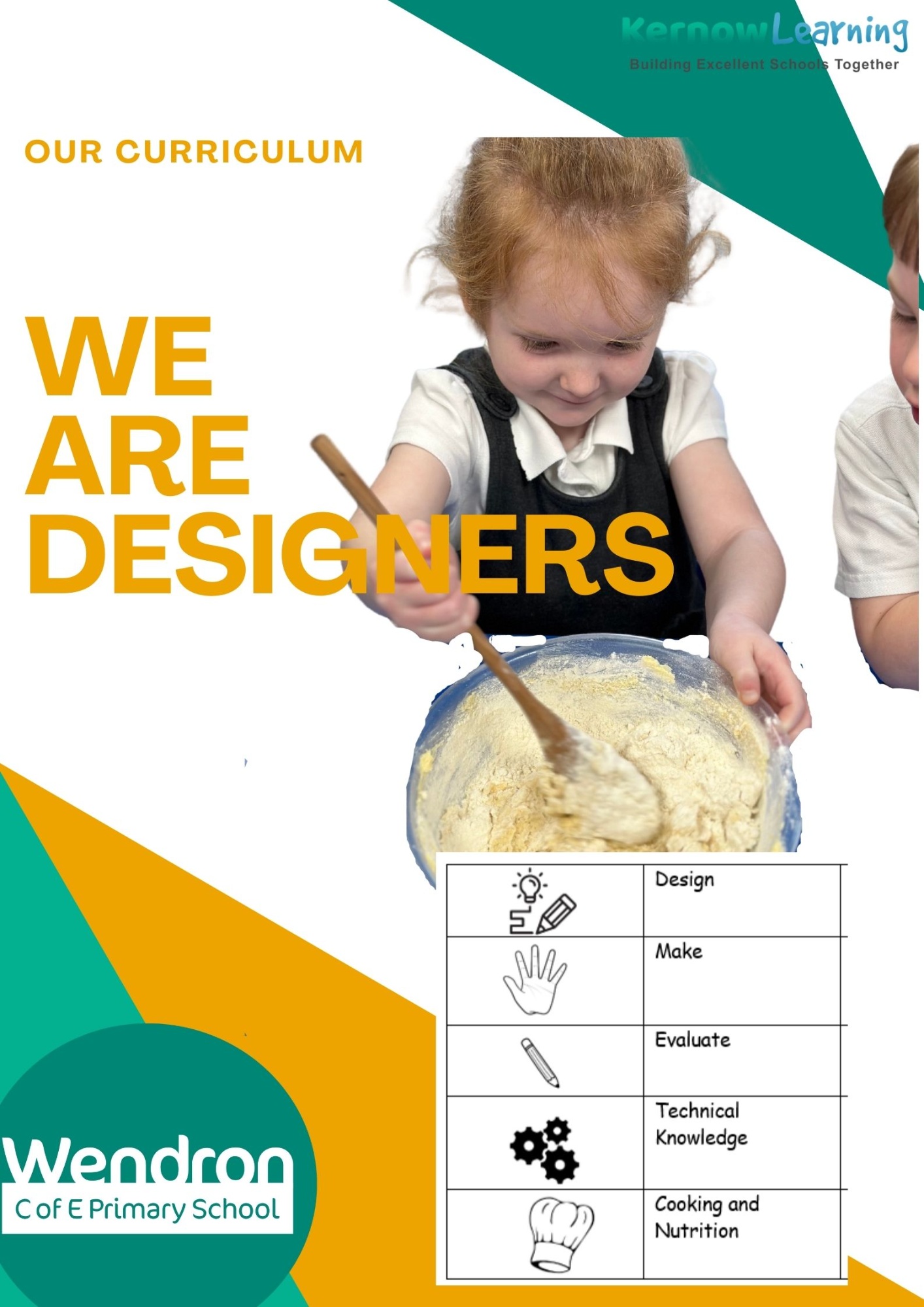
As outlined in the National Curriculum 2014, we aim for all children to:
- develop the creative, technical and practical expertise needed to perform everyday tasks confidently and to participate successfully in an increasingly technological world
- build and apply a repertoire of knowledge, understanding and skills in order to design and make high-quality prototypes and products for a wide range of users
- critique, evaluate and test their ideas and products and the work of others
- understand and apply the principles of nutrition and learn how to cook.
Implementation
Our Design and Technology curriculum provides a scheme of work in line with the national curriculum. The rolling programme is designed as a spiral curriculum so children in KS1 cover projects in structure, mechanisms, textiles and cooking and nutrition across the two years. Children in KS2 cover the above projects as well as digital world and electrical systems. In Key Stage two, the six areas are covered twice to ensure progression. Projects, where appropriate, are linked to class topics for a more holistic and meaningful approach to learning.
- Projects have a clear and progressive structure – research, design, make and evaluate
- Learning is timetabled appropriately to ensure children can build upon skills learnt in other subject areas. E.g. teaching electrical systems in Key Stage 2 once the children have studied Electricity in Science
- Children have opportunities to use skills and knowledge from across the curriculum
- Children learn ‘life skills’ and apply these skills in hands on, purposeful contexts
- Children are explicitly taught safety rules for each project
- Through the curriculum children learn transferable problem solving skills
- Tasks are designed with an emphasis on collaboration
- All children with SEND access the full curriculum. Adaptions in teaching methods and resources are made on an individual basis so all children make good progress.
Impact
Children leave our school as designers. They acquire transferable skills and knowledge that is needed to perform everyday tasks as well as the expertise needed to thrive in an ever-developing technological world. Children develop a passion for Design and Technology. They acquire the knowledge and skills needed to design and make high quality products as well as cultivating an excitement and inquisitiveness in design through the research and evaluation of existing products. Children learn to take an innovative and reflective approach when modifying and evaluating their designs. Children leave our school with the skills needed for the next stage of their learning.
Geography
Intent
At Wendron C of E School , our geography curriculum is designed to develop pupils’ curiosity and fascination about the world and its people that will remain with them throughout their lives.
Learners will investigate a range of places, both in Britain and abroad to help develop knowledge and understanding of the Earth’s physical and human processes. We provide opportunities to investigate and enquire about our local area, this will support children to develop an understanding of who they are, their heritage and what makes our local area so unique and special.
We aim to give our learners strong geographical knowledge, good enquiry skills, the ability to use a range of maps, the skills to collect and analyse data and the ability to communicate information in a variety of ways.
We want the children to have a love of geographical learning, gaining knowledge and skills through high quality teaching both inside and outside the classroom. As the future generation responsible for our planet, we want our children to have a sense of respect for the world around them.
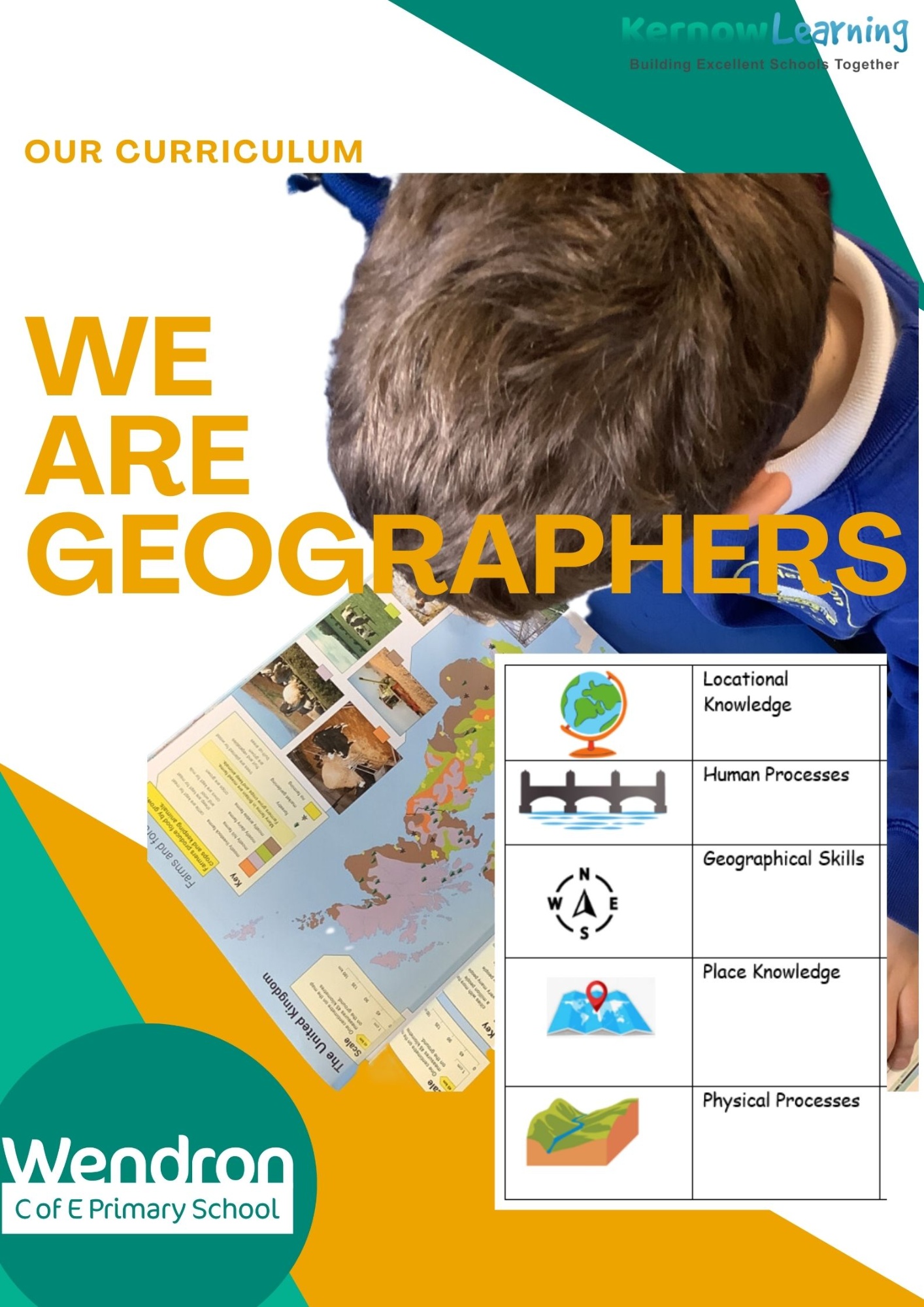
Implementation
We implement a progressive geography curriculum that builds on prior knowledge and skills year on year. The geography curriculum will be taught in response to projects and questions which are aimed to be challenging, inspiring, creative, nurturing and encourage active learning. The learners will revisit geographical skills and knowledge in order to embed and deepen understanding. The lessons are carefully planned to ensure that all children are well supported in their learning and that opportunities for depth is planned for. We ensure that trips and visiting experts enhance the learning experiences for the children.
Impact
The impact of our geography curriculum is that our learners are equipped with the geographical skills and knowledge that will enable them to be ready for the secondary curriculum and for life as an adult in the wider world. The children will be able to discuss their learning and demonstrate their knowledge and understanding through a range of activities.
The children’s learning is assessed against the age-related expectation bands that are based on the 2014 National Curriculum statements for Geography.
History
Intent
At Wendron C of E Primary school, we endeavour to teach History and historical enquiry within a broad and balanced curriculum. Pupils leave Wendron C of E with a secure understanding of chronology; both in Britain and the wider world. Through carefully planned, progressive lessons, pupils are taught about the significance of different historical periods, key historical figures and how History has influenced their lives today. Our intention is that children learn both about History and from History adopting a curiosity and awareness of how History has been interpreted by different people at different times. Through the study of historical evidence and through exploring their local area, pupils will develop a deep understanding of the rich History of their locality. Perhaps more poignantly, pupils will leave our school aware of today’s challenges and how they will be viewed historically in later years.
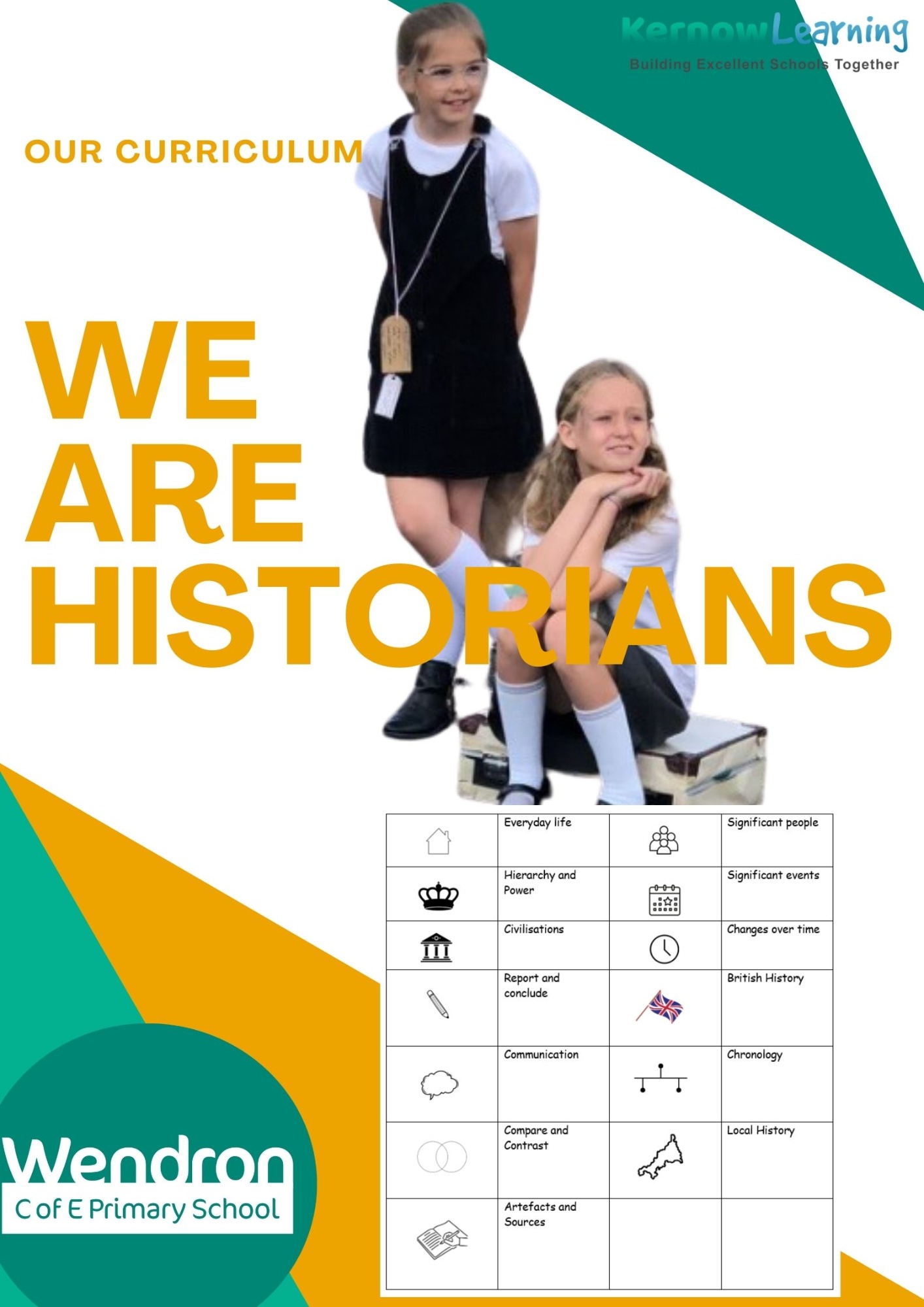
Implementation
The National Curriculum is used to plan and deliver the teaching of History at Wendron C of E in a systematic and progressive way. Our History curriculum has been constructed around key concepts to ensure that history is taught in a spiral, not linear, manner. We enable children to make connections, revise and recap previous History units taught through the use of learning journeys which encapsulate the children’s learning in a personal way. Using pictures, photographs, film clips (primary and secondary), key vocabulary and historical evidence as a starting point, pupils are encouraged to discuss and reason with curiosity what they are presented with and how this can be interpreted. Having studied historical evidence, pupils are encouraged to react to History and use this knowledge to discuss, present, debate, re-enact and write from different historical perspectives. This embeds and consolidates pupils’ understanding of History and its impact on society. In the wider, broad and balanced curriculum, pupils are exposed to a range of stories and poems from different historical periods and a range of ethnicities, including BAME, with the intention of deepening their knowledge of History further. At Wendron C of E, historical learning is made significantly more memorable due to our carefully planned trips, educational visitors and workshops. History is taught weekly during alternate half terms (alternating with Geography) and the sequence of learning is carefully mapped to ensure that children are not overloaded with information. Each unit of learning is planned according to the composite which may take the form of a big question. The component lessons are carefully mapped out in a sequential manner to enable children to be able to have an informed discussion about the composite; both within a unit and also at the end. As part of our focus on oracy, we use various oracy strategies to make the learning more meaningful and memorable. Vocabulary is progressively taught across the school and is often recorded in the children’s learning journeys.
Impact
By the time children in Year 6 leave us, we want them to have the following experiences and understanding:
Knowledge and Skills:
- Have a secure knowledge of the chronology of British history
- Be able to make connections and contrasts and identify links and trends over time and across time periods.
- Developed the appropriate use of specific historical terms
Creativity & Adventure:
- Use a range of sources and understand their strengths/weaknesses
- Describe/make links between main events, situations and changes within and across different periods/societies
- Be immersed in topics in a variety of contexts, including taking part in a variety of trips, visits and experiences
- Recognise how British life and culture have been shaped over time by a huge range of influences from all over the world
- Have an understanding of the similarities and differences between British and wider world history
- Know ways that humans in the past have contributed to innovation for society and exploration of the world
Understanding:
- Regularly address and sometimes devise historically valid questions.
- Construct informed responses by selecting and organising relevant historical information.
- Know how people’s lives have been impacted by decisions made by significant individuals in the past have affected lives.
- Be able to compare modern ideas of fairness and equality to societies of the past and present.
Maths
At Wendron, Mathematics is a fundamental part of each day. We believe that Maths teaches us how to make sense of the world around us. We aim to provide children with the skills in order to develop the ability to calculate, to communicate, to reason and to solve problems; this enables them to explore, understand, and appreciate relationships and patterns in both number and shape in their everyday life. We wish to promote enjoyment and enthusiasm for learning through practical activity, cross-curricular learning, exploration, and discussion.
We deliver the teaching and learning for maths by following the small steps outlined in White Rose 3. We believe all children can achieve in mathematics, and teach for secure and deep understanding of mathematical concepts through manageable steps. Most children will be taught the content from their year group only. We aim for children to become true masters of content, applying and being creative with new knowledge in multiple ways.
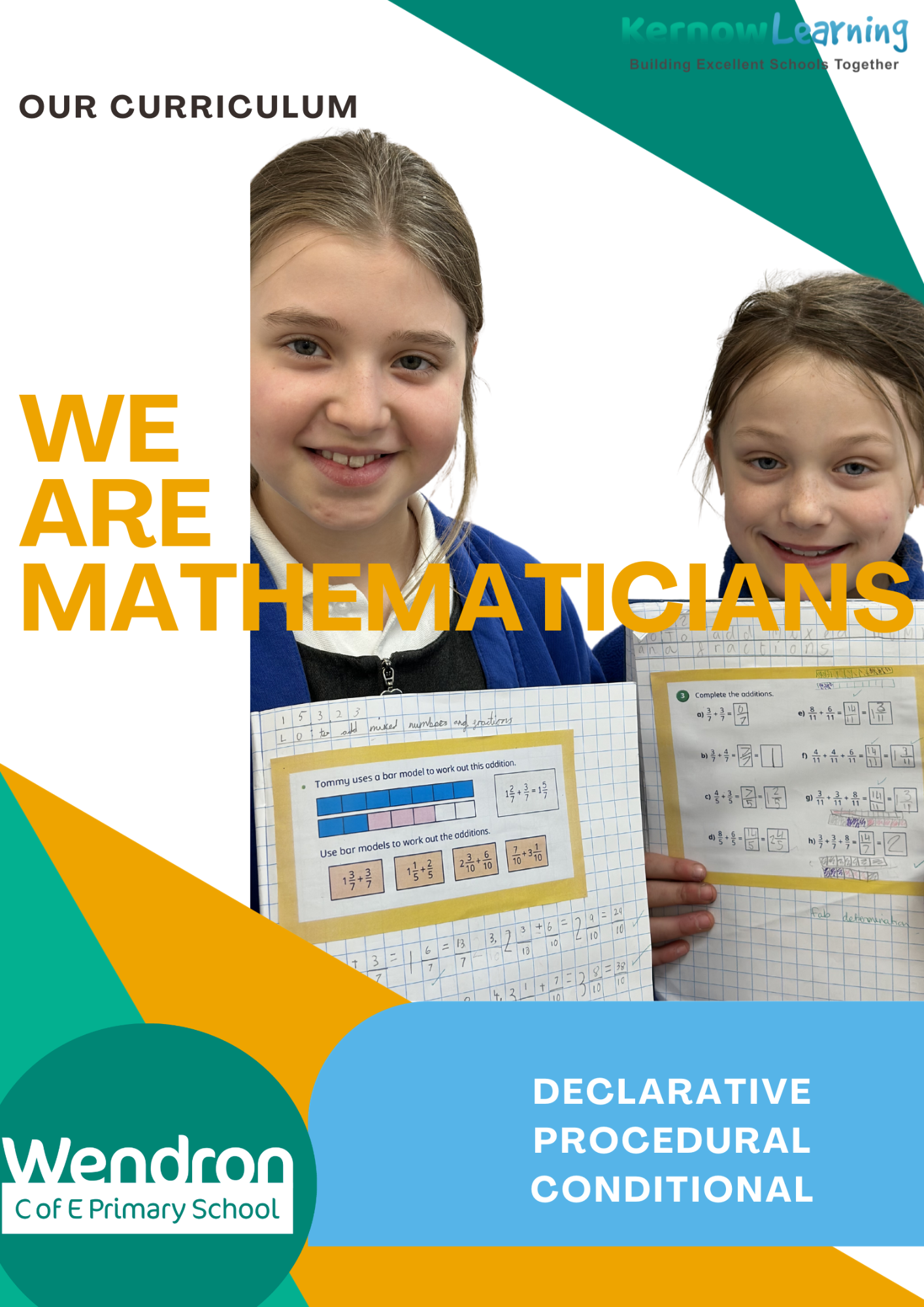
Modern Foreign Languages (MFL)
Intent:
At Wendron, we aim to provide children, from year 1 to 6, with a high-quality education in foreign languages, which develops their passion for learning about other languages and cultures. Our current foreign language taught is French. It is our intention to ensure that by the end of our children’s primary education, they have acquired an understanding of both spoken and written French, confidence to speak in French with others and an understanding of France and the French culture and history. Through our ambitious curriculum pupils will be able to connect to people around the world.
Learning a foreign language provides a valuable educational, social and cultural experience in preparation for future life. At Wendron Primary School the children enjoy “playing with language” and use it in a range of situations.
Pupils who succeed in languages have developed:
- Listening and speaking skills
- Intercultural understanding
- Reading and Writing skills
- History of language and phonics skills.
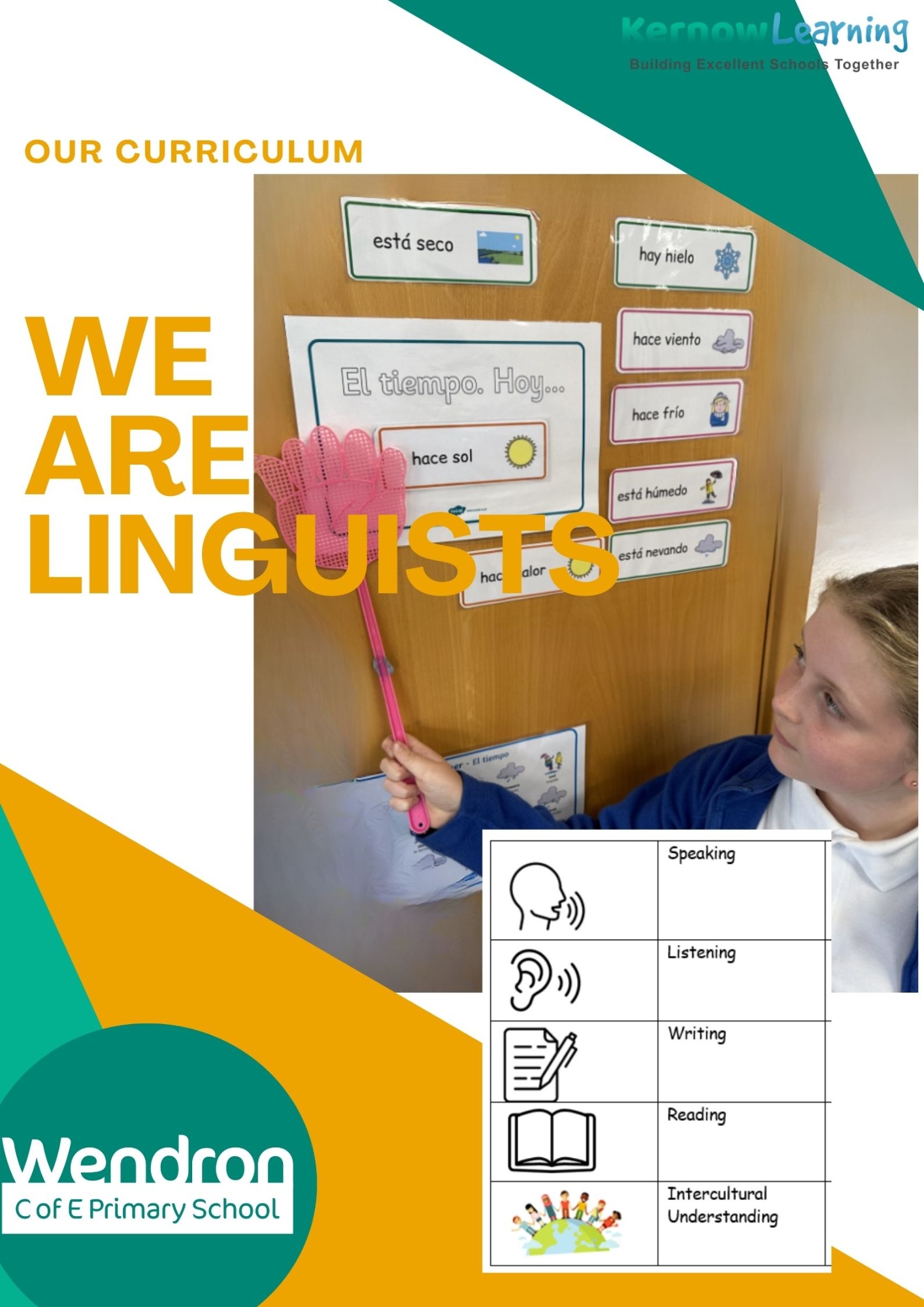
Music
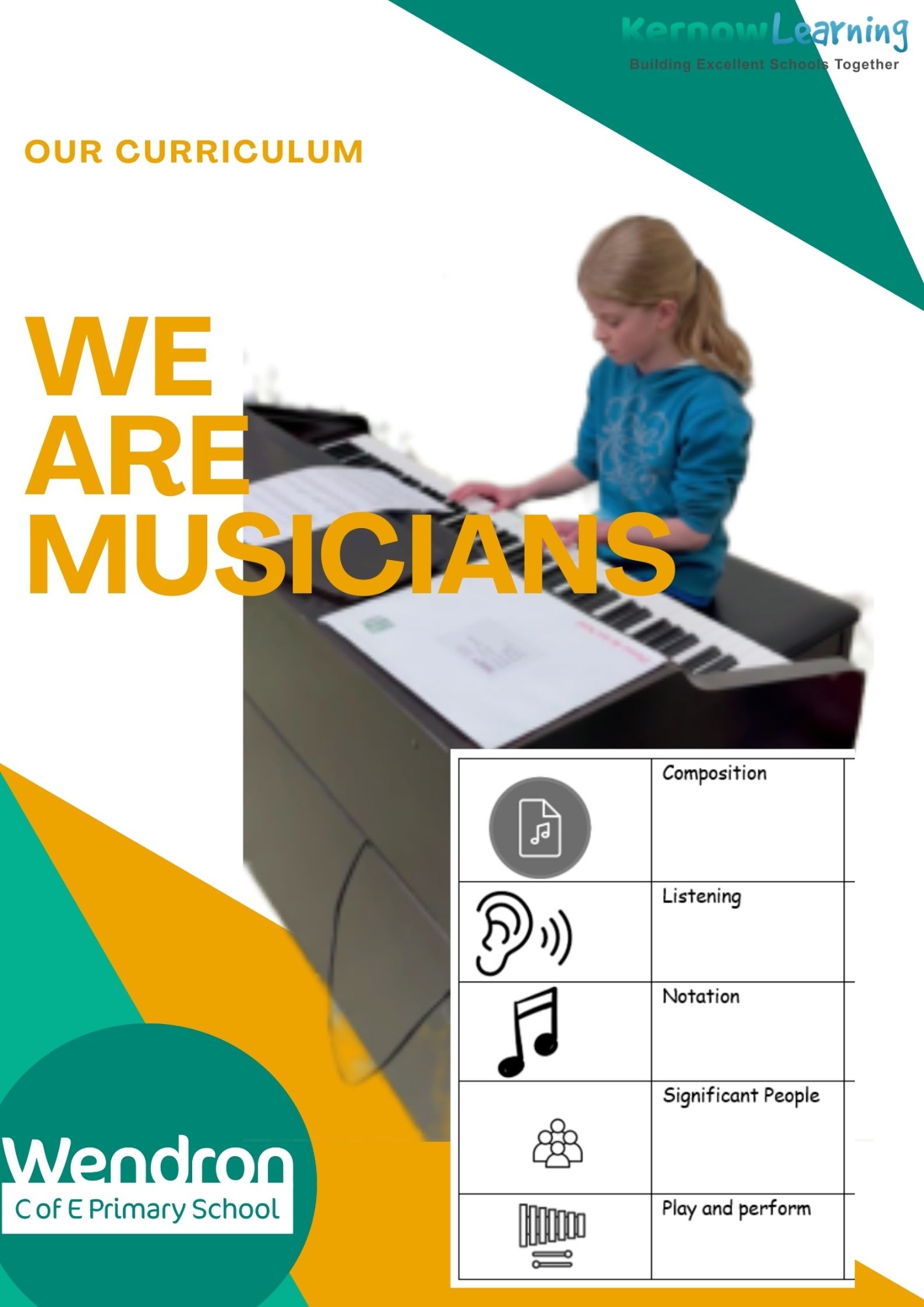
Personal, Social and Health Education (PSHE) and Relationship and Sex Education (RSE)
Intent
At Wendron School, personal, social and health education enables our children to become healthy, independent and responsible members of society. It aims to help them understand how they are developing personally, emotionally and socially, and tackles many of the moral, social and cultural issues that are part of growing up. We provide our children with opportunities to learn about rights and responsibilities and appreciate what it means to be a member of a diverse society. Our children are encouraged to develop their sense of self-worth by playing a positive role in contributing to school life and the wider community through opportunities such as school council, fab friends, Worship Warriors, learning detectives, reading ambassadors and safety ambassadors.
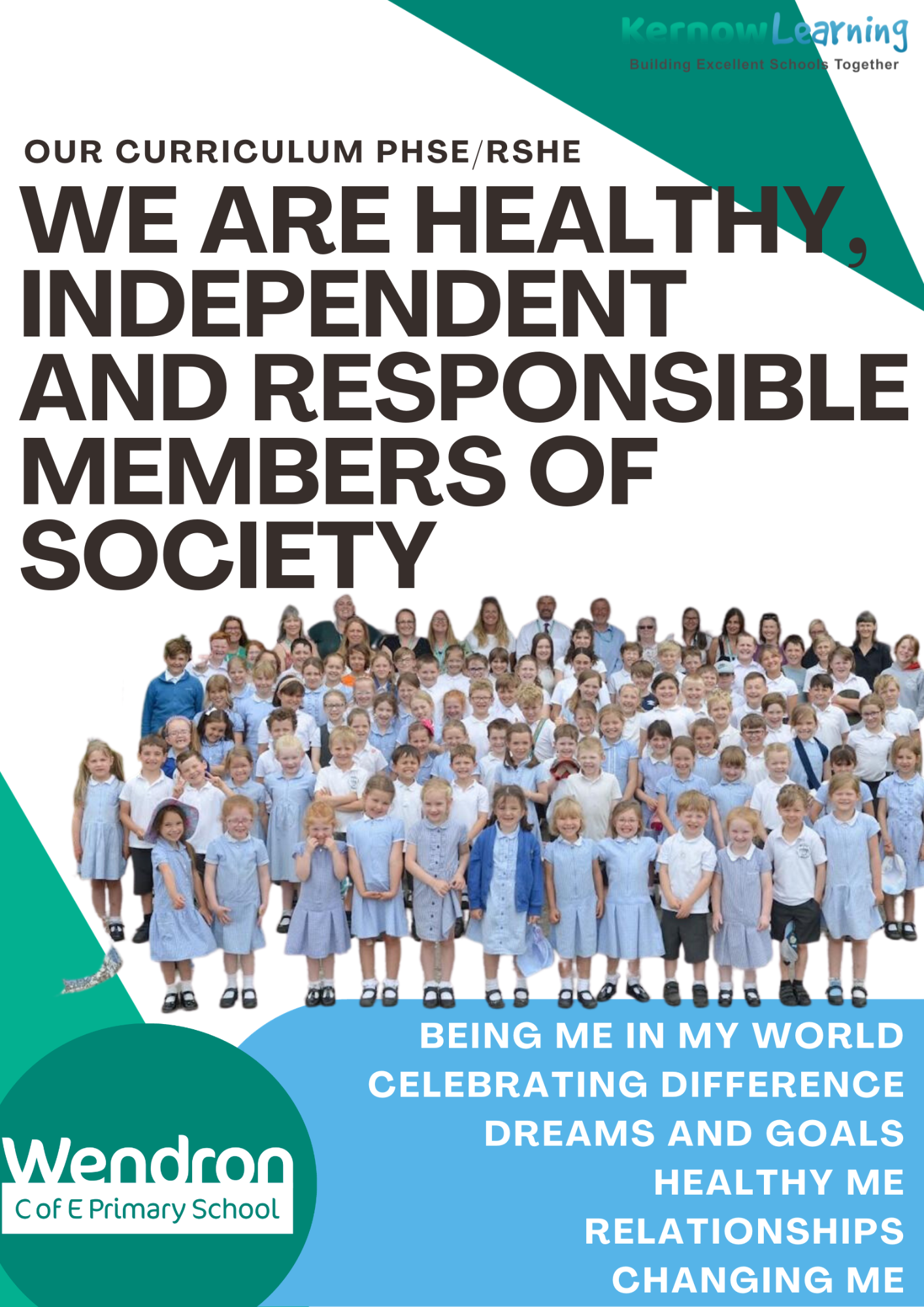
Implementation
We follow the scheme ‘Jigsaw’ at Wendron School, which meets the current needs of our children. The curriculum focuses on the three core learning themes: health and wellbeing, relationships and living in the wider world and builds in opportunities to link British Values and SMSC. The curriculum is constantly reviewed and updated according to the Governments advice, building on the statutory content already outlined in the national curriculum, the basic school curriculum and in statutory, on: drug education, financial education, sex and relationship education (SRE) and the importance of physical activity and diet for a healthy lifestyle. We have a TIS practitioner and this assists with understanding the importance of relationships.
PSHE is taught both as a discreet subject, as well as through whole class teaching and assemblies. Children are provided with frequent opportunities to have their voice heard and because of this; they play an active part in school life. Children are able to express their opinions and views through a variety of mediums including suggestion boxes questionnaires, school council discussions, and comments on various correspondence throughout the year e.g. reports, SEND support profiles, focused reviews, annual questionnaires, work and homework. Children have the opportunities to meet and work with members of the community, such as health workers, firefighters, police, and representatives from the local church and community. We also develop PSHE through activities and whole-school events e.g. the school council representatives from each class meet regularly to discuss school matters. We offer residential trips to various year groups, where there is a particular focus on developing pupils’ self-esteem, self-confidence, self-belief and giving them opportunities to develop leadership and co-operation skills through team building, as we want all children to aim high to achieve their maximum potential.
Impact
Children are resilient learners and excellent communicators and are able to discuss personal matters with appropriate adults, as well as sharing in emotional literacy and discussion. Children demonstrate and apply the British Values of Democracy, Tolerance, and Mutual respect, Rule of law and Liberty. All of our children demonstrate a healthy outlook towards themselves and school and all behaviour is good so that all children can achieve their age related expectations across the wider curriculum.
Physical Education
Aims and objectives
Physical education develops the children’s knowledge, skills and understanding, so that they can perform with increasing competence and confidence in a range of physical activities. These include dance, games, gymnastics, swimming and water safety, athletics and outdoor adventure activities.
Physical education promotes an understanding in children of their bodies in action. It involves thinking, selecting and applying skills and promotes positive attitudes towards a healthy lifestyle. Thus we enable them to make informed choices about physical activity throughout their lives.
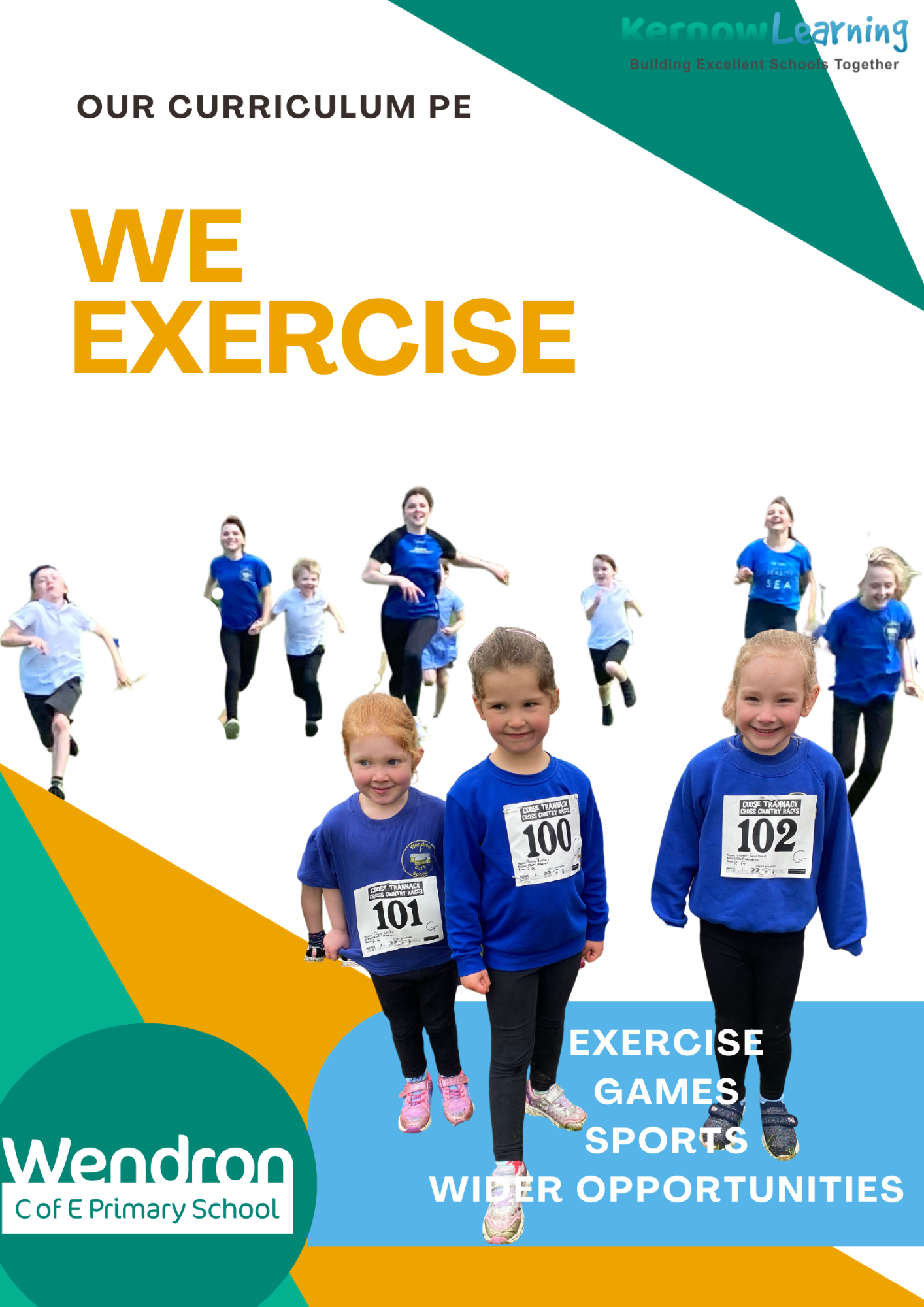
Our Intent
The delivery of inspirational and high quality Physical Education forms a fundamental part of Wendron School’s ethos. We recognise that as a school we are responsible for the development of the entire child, we are committed to developing physical well-being, healthy choices as well as the mind. We endeavour to provide all pupils with the knowledge and skills to enable them to become healthy and active young adults. We encourage children to participate regularly in a varied and innovative range of activities. This gives them the opportunity, regardless of ability, to meet physical challenges, develop essential motor skills, appreciate the fun and joy of competition, increase their self-esteem, and at the same time develop strategies for improvement. Our mission in Physical Education is to enable each pupil to reach their full potential for future success in society.
Implementation
We deliver this intent in different ways:
- PE lessons are high quality for all abilities with lesson structure planned to enable all children to achieve but also to strengthen and develop both skills and with teams in full game situations.
- The progression of skills has been planned for all areas of PE in every year group to ensure that the lessons and activities are matched to the child’s age and ability. This ensures progression in all year groups.
- A new and ever evolving PE Scheme of work is used so that teachers are supported with skill knowledge, activity ideas, ICT links and progression within each lesson. This supports in the delivery of high quality lessons.
Through these key areas the whole child is developed and skills are learned that are used in the wider world as well as sports, competition and physical activity.
- Daily activity is encouraged. This is done through the active playground, playground leaders running activities and organising resources and the Wendron Whizz Around. Every class has timetabled sessions of Physical Education lessons each week.
- To help keep the pupils excited and enthused with their physical activity, we have strived to provide a variety of extra-curricular clubs.
- Sports and Playground Leaders are trained and developed each year. They learn skills in organisation, motivation, leadership and supporting others to enjoy being active. This teaches them many real life skills and qualities that they will need throughout their whole life.
- The Sport Premium funding is used each year to continue to improve the provision of Physical Education. We have explored different sports, enabling our pupils to have the best possible experiences.
- Extra-Curricular Clubs include: Football, Cross Country, Netball, Bikes, Sailing, Rounders, Boogie Bounce and Athletics.
- Sports Premium funding has included: open water swimming, water sports, horse riding, multi skills, climbing, gymnastics, skipping, Boogie Bounce, surfing.
- Pupils take part in cluster competitions and festivals throughout the year. Through regular monitoring, we try to ensure that a high number of our pupils participate.
Reading
Intent
At Wendron, reading is a top priority. Members of staff provide the children with vocabulary rich environments, high quality texts and inspirational learning opportunities. We are committed to helping the pupils:
- Develop a love of books and read expressively with accuracy, fluency and understanding.
- Apply their knowledge of phonics to decode unfamiliar words with increasing speed.
- Engage with a wide range of texts and feel confident in their ability to make predictions, summarise and infer using evidence to support their opinions.
Implement
- Adopting the Read Write Inc. approach, phonics is taught daily in the Early Years, KS1 and to those who require it in KS2. The phonic screening check is taken by Year 1 during the summer.
- Using carefully selected and high-quality texts, Key Stage 1 and 2 engage in whole class reading lessons. This enables the teacher to model a range of skills and exposes the pupils to rich, extensive vocabulary.
- Lessons are thoughtfully planned and sequenced, using our 5 day reading plan, so that children can frequently develop skills in all areas.
- Classes have a ‘daily reader’ that has been chosen to excite, engage and challenge.
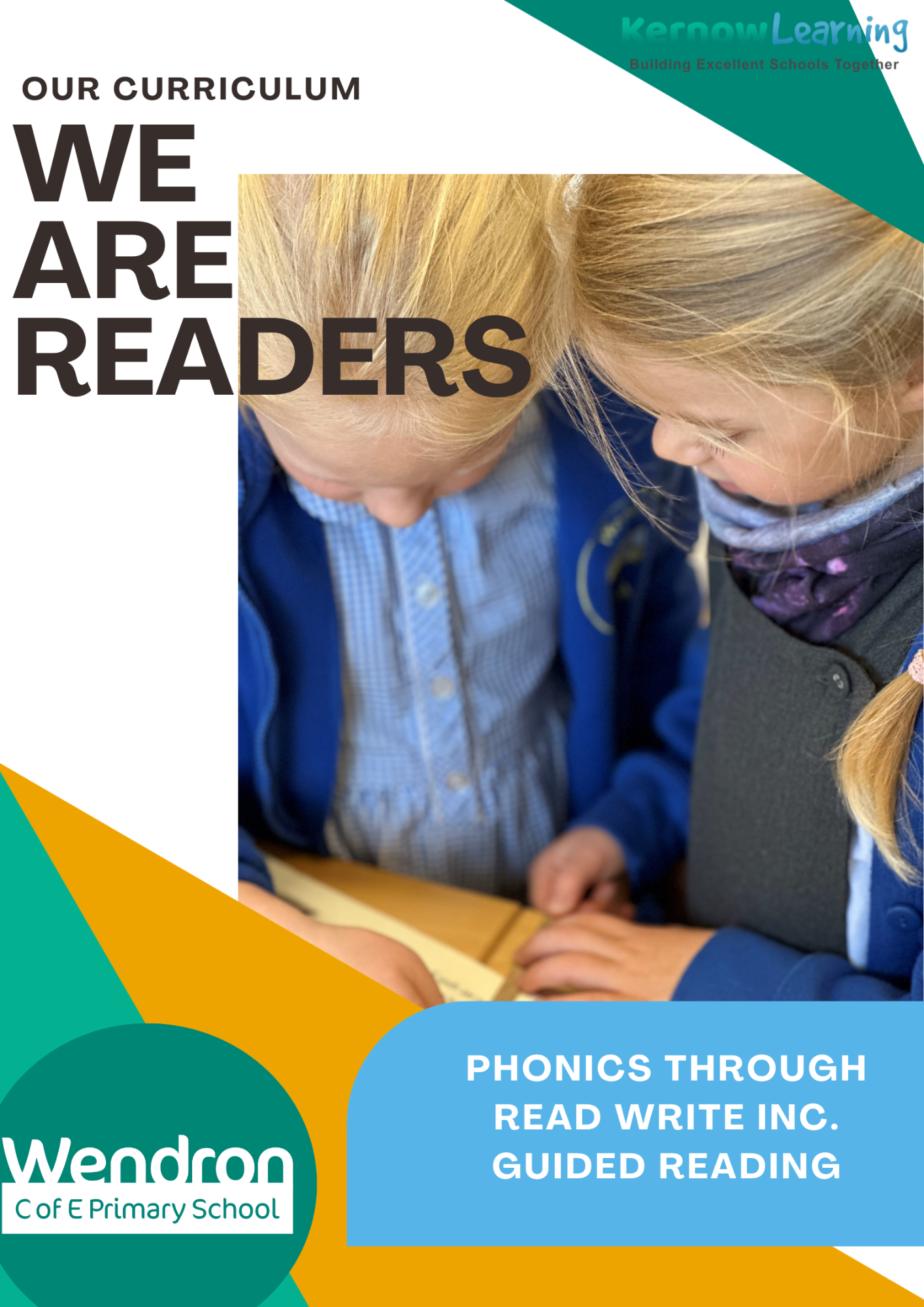
Impact
We firmly believe that reading is the key to all learning so the impact of our curriculum goes beyond statutory assessments. Prior to leaving Wendron, it is our aspiration that:
- All children have developed a life-long love of reading and books.
- All pupils are fluent, confident and able readers, who can access texts for pleasure and enjoyment, as well as use their reading skills to further their knowledge in all areas of the curriculum.
- Children are confident in their ability to discuss texts from a range of genres, recommend books to their peers, evaluate the authors use of language and then appreciate the impact this can have.
Guided Reading Weekly Plan (Reading after Phonics)
|
Monday |
Tuesday |
Wednesday |
Thursday |
Friday |
|
Introduce any new vocabulary (MTYT).
Give the meaning of the new words.
Teacher read aloud, with students following the text. |
Quickly revisit the new vocabulary- partners can tell each other the meanings.
Teacher read aloud.
Pupils Echo read key phrases.
|
Partner reading.
Pupils work with a partner and take it in turns to read whilst the partner follows. |
Choral reading
Choose a section from the text to read aloud together.
Concentrate on expression.
Discussion- this could be in pairs/ small groups/ whole class. To cover inference, prediction and comprehension. |
Discussion and questions
This can be written- floor books or individual books.
|
Here are some tips for reading at home with your child:
Please help us to give every child the very best opportunities during their primary years of school.
- Read with your child every day – and that is all children of all ages.
- Ask them questions about their book.
- Ensure they can decode fluently as well as understand and enjoy the story/text.
- Join your local library to access a whole range of books to read at home.
- Read for enjoyment. This includes fiction, non-fiction, comics, novels, magazines, leaflets etc
- Don’t forget rhyme, repetition and poetry. These can really engage children of all ages.
Above all, make it fun!
Reading challenge.
Listed below are the top fifty books that are recommended that your child reads. Have a look and see how many of these you can read this year. If you click on the link you can also download a checklist too. Happy reading!
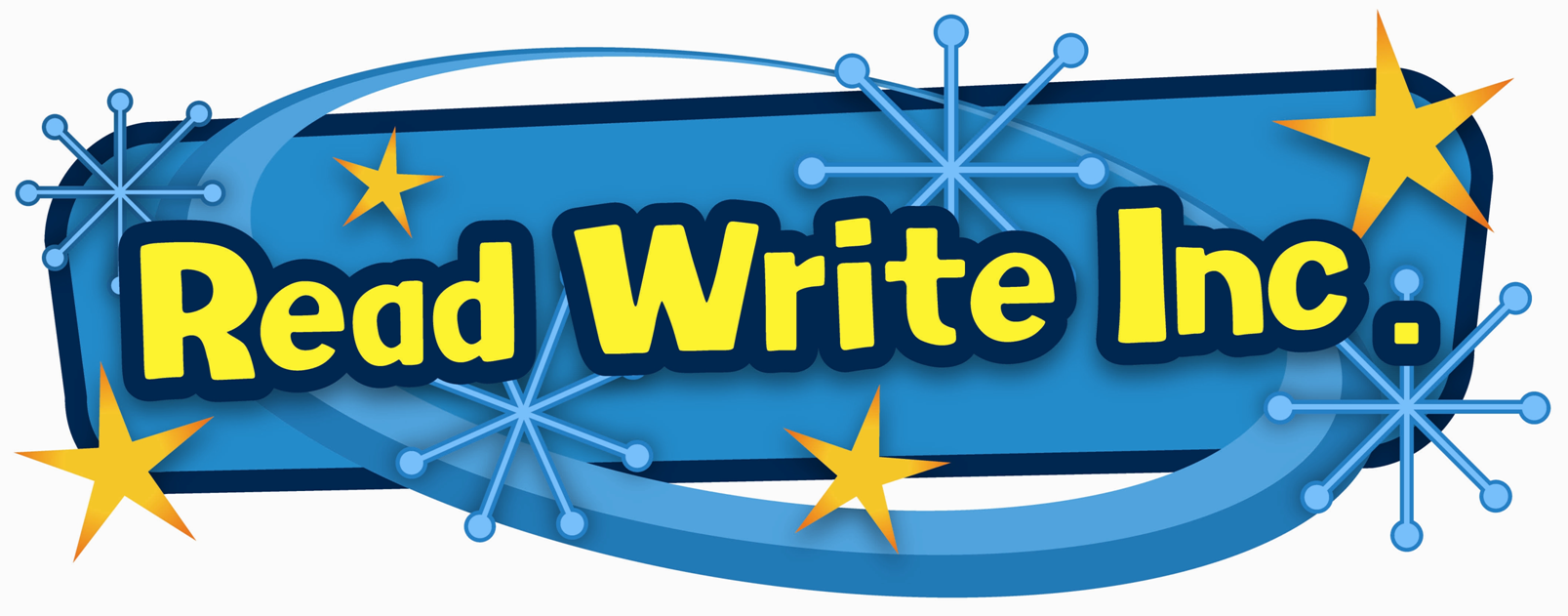
At Wendron C of E Primary School, we use the ‘Read Write Inc’ phonics programme designed by Ruth Miskin to teach early reading. The structured programme helps all children learn to read fluently and at speed so they can focus on developing their skills in comprehension, vocabulary and spelling. At the core of the programme is the lively and vigorous teaching of synthetic phonics. Children learn the 44 common sounds in the English language and how to sound-blend words for reading (decoding) at the same time as developing handwriting skills and spelling (encoding).
We have found that by using the Read Write Inc. programme, children experience success from the very beginning of their reading journey. Lively phonic books are then closely matched to their increasing knowledge of phonics and as children re-read stories their fluency increases. The stories include prompts to support thinking out loud and discussions, helping children develop the skills they need to be successful storytellers.
Read Write Inc. lessons are fun and engaging and all staff who deliver the reading sessions are fully trained. The lessons are taught daily and pupils are regularly assessed and grouped to enable appropriate challenge and pace throughout the programme.
Religious Education
Religious Education at Wendron explores big questions about life, to find out what people believe and what difference this makes to how they live.
RE helps the children to make sense of religion and belief, reflecting on their own ideas and ways of living.
Our school aims that every child will ‘Be the best they can be’ which is supported by the bible quote:-
“To live life, life in all its fullness” John 10:10
This is illustrated with the parable of the sower which shows that we can meet our potential when we have faith and flourish this is symbolized by the seeds that fell on the good soil.
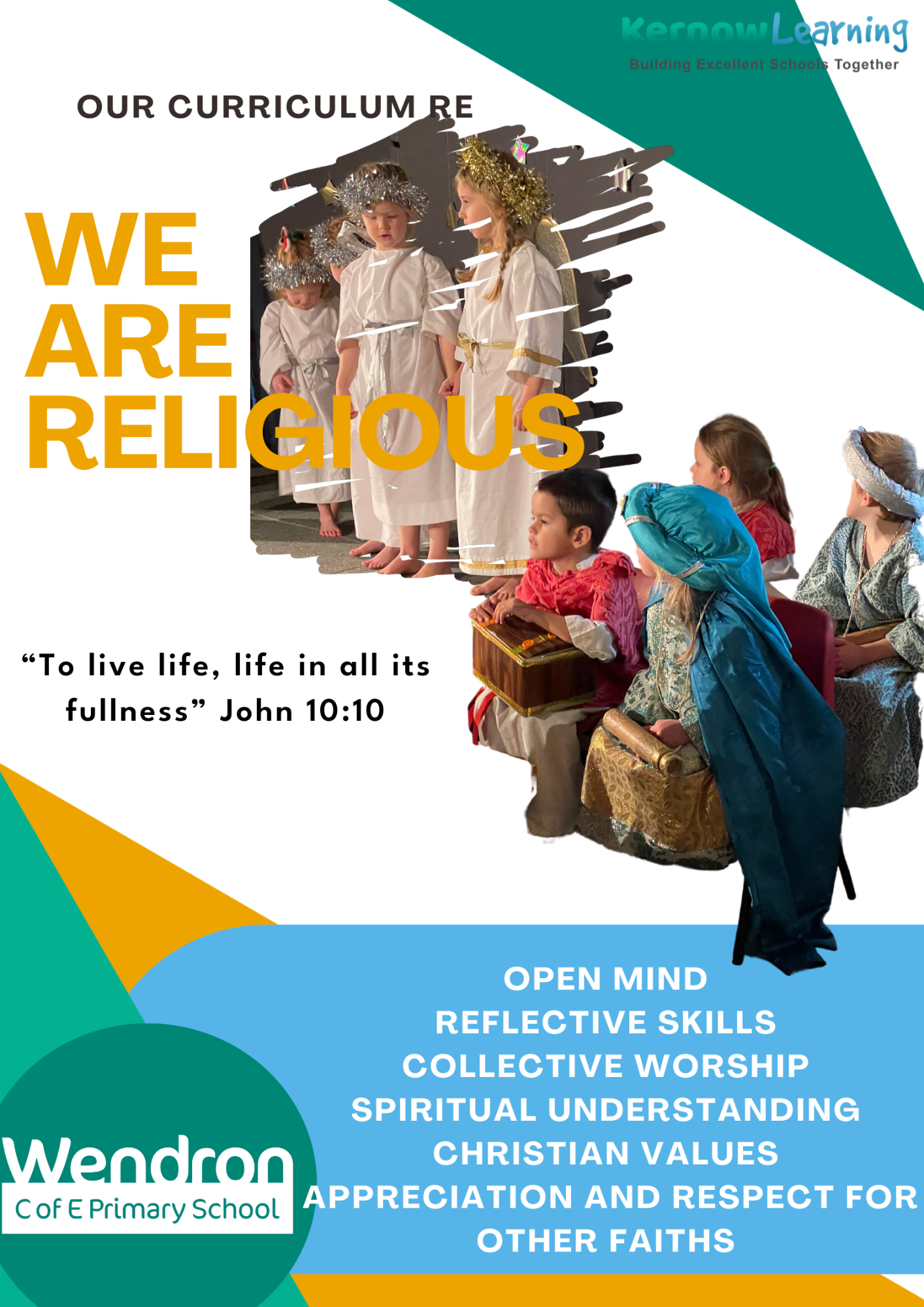
At Wendron CofE VA Primary School, children are taught to understand and respect the importance of religious beliefs in the world around them. The school follows the locally agreed RE syllabus. We encourage children to use and develop their skills in RE and to participate in deeper spiritual thinking. We define spirituality as ‘ a special connection.’ We aim to ensure that the RE curriculum is challenging, dynamic and relevant to pupils of all ages. It is a spiral curriculum building on previous learning as they move through the school.
In each class the focus is as follows:-
Foundation stage /Year1 - Christianity, Judaism and Kernewek (Cornwall)
In Year2/3 Islam, Hinduism, Christianity and Kernewek (Cornwall)
Year 4/5 Christianity, Hinduism, Judaism, Islam and Kernewek (Cornwall)
Year 5/6 Christianity, Hinduism, Islam, Judaism and Kernewek (Cornwall)
Pupils who succeed in RE have developed:
- Open mind
- Reflective skills
- Lead some aspects of collective worship
- Spiritual understanding
- Christian values
- Appreciation and respect for other faiths
Implementation: Long and medium term planning comes from the local New Agreed Syllabus and the Understanding Christianity programme.
Impact: measurement is through assessments that take place termly
We support the curriculum with a range of resources. For the teaching of Christianity we use the Understanding Christianity resources and the accompanying freize showing the bible in pictures.
Science
Intent
At Wendron C of E Primary School our children are Scientists! Our Science curriculum fosters a curiosity in children about the world around them. Through the acquisition of key foundational knowledge and concepts, we aim for all pupils to develop a sense of excitement and inquisitiveness about natural phenomena. Our broad and engaging Science curriculum challenges and engages our learners: through direct practical experience; scientific knowledge and use of rich, scientific vocabulary. Our curriculum aims to equip pupils with the knowledge and understanding needed to lead responsible and healthy lives, make informed choices and have an understanding of their role as a citizen in the global community so they can, ‘Live life, life in all its fullness’ (John 10:10).
The skills for ‘working scientifically’ are embedded in the teaching of substantive science content within our programme of study. Pupils have opportunities to learn through the five areas of scientific enquiry: pattern seeking, research, fair testing, observation over time and identifying and classifying. Children are encouraged from EYFS to Year 6 to develop curiosity through asking questions.
As outlined in the 2014 National curriculum, our Science curriculum aims to ensure all children:
-
develop scientific knowledge and conceptual understanding through the specific disciplines of biology, chemistry and physics
-
develop understanding of the nature, processes and methods of science through different types of science enquiries that help them to answer scientific questions about the world around them
-
are equipped with the scientific knowledge required to understand the uses and implications of science, today and for the future.
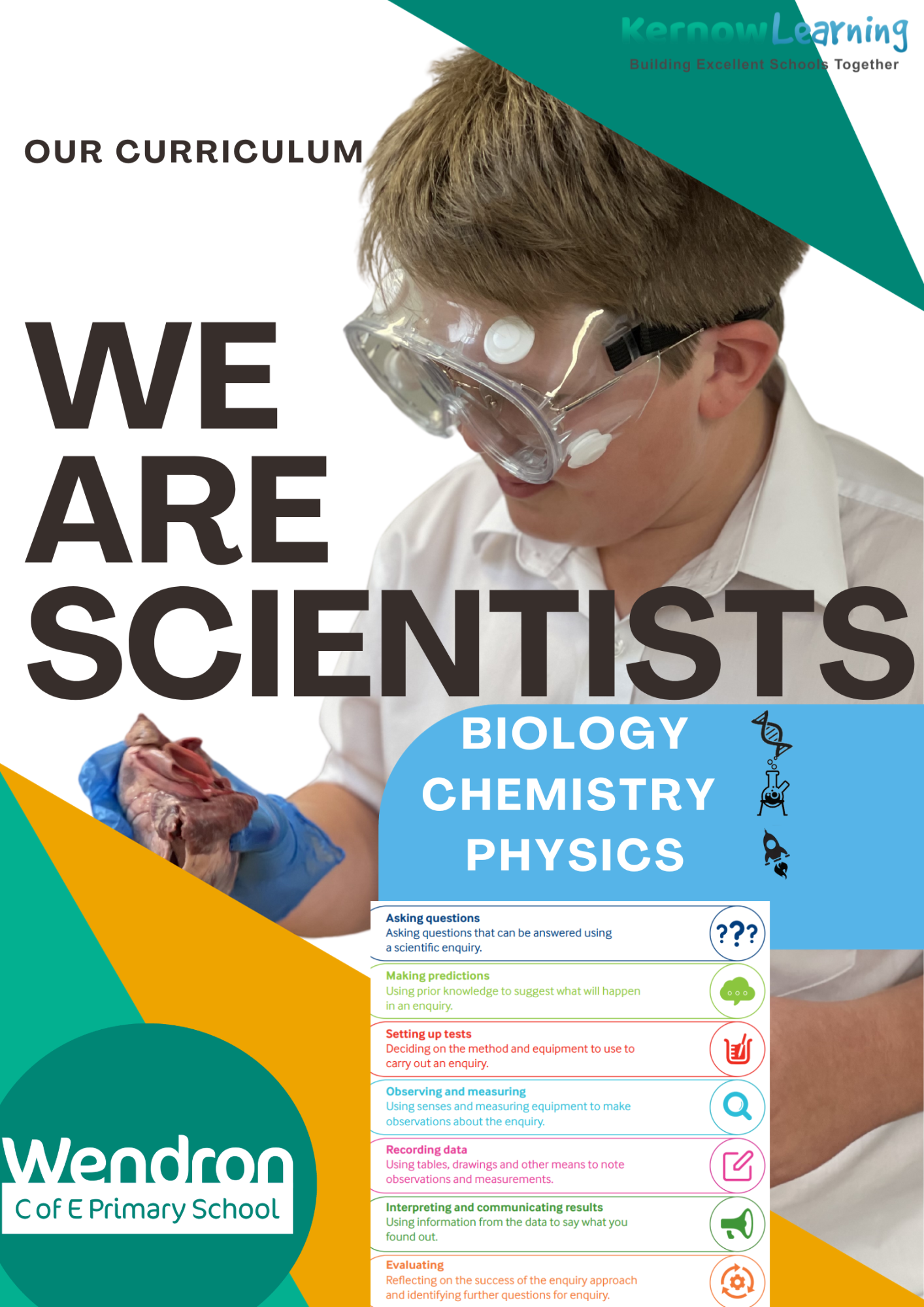
Implementation
We implement a progressive Science curriculum where knowledge and skills are built upon. The curriculum is mapped out in cycles for most year groups due to our mixed age classes. There is a two-year rolling programme for Year 1/2 Year 3/4 and Year 5/6. EYFS is taught as a single year group.
Our programme of study uses ‘Cornerstones’ as a starting point. Schemes of learning are adapted using the ‘ASE Plan’ resources; ‘Ogden Trust’ resources and to meet the needs of the class – ensuring a robust and rigorous Science curriculum is accessed by all learners.
-
The curriculum ensures coverage of the specific disciplines in Science (Biology, Chemistry and Physics).
-
Teachers plan giving children opportunity to use all 5 of the Scientific Enquiry types: identifying, classifying and grouping; research using secondary sources; observing over time; pattern seeking and comparative and fair testing.
-
Each class uses a floor book to document ‘working scientifically’ skills. This is used as a scaffold to link prior knowledge.
-
Children have the opportunity to develop knowledge and skills through regular Science lessons.
-
All children have access to high quality Science lessons, regardless of their educational needs. Teachers plan provision for SEN requirements and accessibility on an individual basis.
-
Children have access to a knowledge organiser detailing key information and vocabulary and a sequence of learning outlining the progression of knowledge.
-
Common misconceptions and preconceptions are planned for by the teacher using the ‘PLAN Knowledge Matrices’. Misconceptions are addressed as they arise through teacher assessment.
-
Practical first-hand experiences are planned for to create engaging learning environments and make learning memorable.
-
Children are given opportunities to regularly review learning to support them in knowing more and remembering more.
-
Teachers use effective strategies for questioning and modelling to enable children to learn effectively.
-
Children are assessed on the key knowledge objectives and appropriate working scientifically objectives before the end of each unit. Any misconceptions of gaps are addressed in the final lesson.
-
Teachers actively promote enjoyment and foster the children’s natural inquisitiveness in well planned and implemented lessons.
-
Class visits and visitors are planned to enrich learning where appropriate.
Impact
This successful curriculum results in a fun, engaging and high quality science education that provides children with the foundations of knowledge and skills for enquiry needed as they progress onto the next stage of their education. Children make good progress in Science and are therefore expected to leave Wendron School reaching at least age expectation.
Our children become Scientists; this is evidenced through pupil voice, work scrutiny, floor books, teacher assessments and importantly classes full of enthusiastic Science learners.
Children at Wendron have:
-
A wide variety of skills linked to both scientific knowledge and understanding, and skills for scientific enquiry and investigation covering the programme study from the national curriculum and beyond.
-
An understanding of how developments in science have changed and shaped our world and are ever evolving.
-
Clear communication skills both verbally and written to explain their results.
-
Resilience in their learning.
-
A rich vocabulary to articulate their understanding of concepts.
-
The self-assurance and knowledge to pursue ambitions and aspirations into their next stage of education, enabling them to carry this forward into their future careers.
-
A curiosity to continue their learning of the natural world.
Writing
Intent:
We strive to plan and teach a rich, engaging English curriculum, promoting a culture of learning. Driven by high quality teaching and strong subject knowledge, we intend to raise standards for writing to ensure that children are prepared with the linguistic knowledge of vocabulary and grammar, whilst drawing upon authors to develop their own writing styles and confidence.
Implementation:
We use high quality texts, made to make these units purposeful and appropriate to the needs of our children. Enthusiastic teaching creates excitement and engagement towards our units, supported by a literacy-rich environment. As children internalise a number of different text types throughout their years at Wendron, they build a bank of tools to help them write creatively, supported by strong scaffolding and modelling so that children become confident to invent their own stories.
Impact:
Our intended impact is that children will be inspired to write through modelled writes and writing workshops as well as wanting to write independently. Children will talk positively about their writing experiences at school and will be able to make direct links between what they read and what they write.
